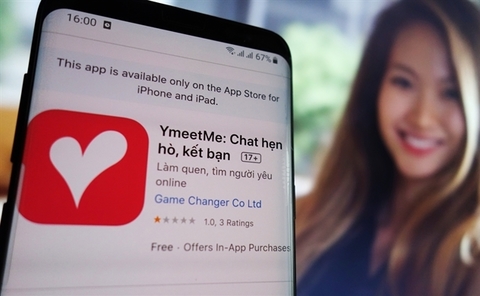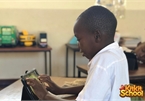 |
|
YmeetMe has more than two million users after three years of operation in Viet Nam. — Photo nhipcaudautu |
A local Tinder user told Viet Nam News: “I never used to pay for Tinder and just used the free service they provide. But I started a six month paid package in March because I was bored staying at home. I needed more people to share with.”
At the age of 34 with a busy working schedule, Vinh Nguyen (not his real name) started searching online for his 'other half' in September last year. Though he has been matched with more than ten women, none of them fit the bill.
Vinh paid VND400,000 (US$17) for a six-month package.
“It's not too much and it is convenient. It was much more difficult finding matches offline," he said.
Earlier this month, Tinder said in a press realease that: “ In this crazy time, people are feeling a potent mix of anxiety and loneliness.”
So, it announced it would activate its Passport feature for free to all members to let them match potential love interests across the globe to deal with the loneliness created from social distancing in many parts of the world.
The feature is normally only available for paying users.
Tinder is one of many dating apps available on the market. Others include local apps such as VietnamCupid YmeetMe and Rudicaf, as well as international apps that include OkCupid, Facebook Dating, Grindr, Chicher and Joyride.
With a population of 96 million and a high number of tech-savvy citizens, Viet Nam has great potential for dating apps.
However, compared to other markets, the revenue from dating apps in Viet Nam is low.
According to analysis by App Annie in its "Mobile Status Report 2020", in 2019 consumers worldwide spent $2.2 billion on dating apps, more than double from 2017.
The market worth $1.5 billion in the US, $400 million in Japan and $13 million in India.
The report also said the number of users searching for partners via their mobiles in Indonesia, Malaysia and Singapore soared and led the trend in the region.
In particular, Indonesians spent $5.8 million on online dating, up 260 per cent from 2017. Malaysians also spent around $5.8 million on pairing apps last year, increasing from $1.8 million in 2017. At the top, Singaporeans were the biggest spenders in Southeast Asia, with $7.1 million in 2019, up sharply from $3.9 million in 2017.
But there is no data for the local market yet.
Last year, Tinder became the first dating app to be named the world's number 1 mobile app, with a total revenue of about $1.2 billion, up 43 per cent compared to 2018, which helped it surpass streaming giants Netflix and Tencent.
Focusing on the region, Match Group, the US internet company that owns Tinder and a number of dating websites such as Match, OkCupid, PlentyOfFish, has appointed some leading positions in South Korea and in Southeast Asia, and also established representative offices in Japan and Indonesia.
Though there is no official data of the number of Tinder, OKCupid of Match Group users in Viet Nam, some representatives of local dating apps have high expectations for the market.
Tomokazu Imamura, CEO of YmeetMe, told local media: “YmeetMe has more than two million users after three years of operation in Viet Nam.”
He thought it was a good start for the company's business in the country and said: “Viet Nam is a potential market." — VNS

Popular educational apps for children during school closure
The long school closure as a consequence of the novel coronavirus outbreak has kept parents occupied with the question of how to keep their children both entertained and educated.

App encourages recycling
Nguyen Huu Thuan, the manager of a technology company in HCM City, recently set up a second-hand item sharing app, which has become a platform for people who want to give away or receive things for free.
 Dating apps are nothing new to many Vietnamese people, but the COVID-19 pandemic seems to have increased their popularity.
Dating apps are nothing new to many Vietnamese people, but the COVID-19 pandemic seems to have increased their popularity.